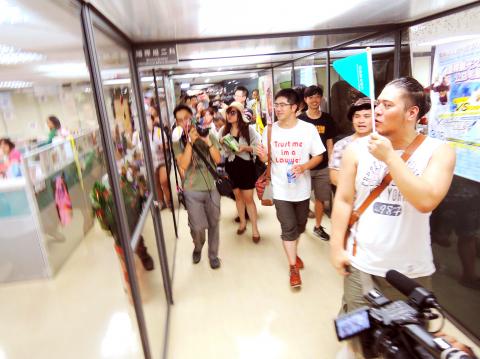Aboriginal activists yesterday organized a “tour group” to visit the Tourism Bureau headquarters in Taipei to protest the agency’s proposal to encourage Chinese tourists attend Ilisin festivals and other traditional events held in Amis Aboriginal communities along the east coast.
“Okay, everyone, look over to your right. We have now arrived at the Tourism Bureau and you can see that the staff here are performing the act of working,” Hualien County resident Namoh Nofu, a member of the Pangcah Amis Defense Alliance who acted as the tour guide, told a group of activists acting as tourists.
“Now, look, there’s a lady on the other side of the office showing us how to make a telephone call,” he said.

Photo: Loa Iok-sin, Taipei Times
“Wow, so this is what the Tourism Bureau people wear at work,” one of the members of the “tour group” said.
“Is there free Wi-Fi here?” another one asked.
Wearing a large straw hat, sunglasses and high heels while carrying a bag of snacks and taking pictures, Lisin Tefi, an Amis from Makuta’ay Village in Hualien County, said that she was dressed like the tourists in their village during festivals.
“Some tourists come to our festivals with absolutely no respect for us. They wander around, littering, taking pictures, making comments aloud about our traditional outfits, asking villagers to pose for them,” Lisin said.
“Some even go as far as asking villagers to take off their traditional outfits and lend it to them for pictures,” she said.
“It’s really very upsetting when such things happen,” she said.
“We would like the staff at the Tourism Bureau to understand how we feel when this happens,” she added.
Several bureau employees seemed to have been bothered by the demonstration and tried to stop the activists by saying: “This is the place where we work, not a tourist attraction.”
“Our villages are places where we live, not tourist attractions either,” the activists said.
The activists were protesting a bureau project to mark the year as “the year of Aboriginal village tourism,” and came up with a list of Aboriginal festivals — including the Amis group’s Ilisin, which is held in every village throughout the summer — for tourists to select events they would like to attend.
“We didn’t come up with the proposal out of disrespect, rather, we planned it with all due respect,” said Lin Hsiu-hsia (林秀霞), director of the bureau’s Technical Division.
“We don’t want to see tourism in Aboriginal villages being controlled by large corporates from the outside,” she said.
“This is why we would like to help Aboriginal communities participate in the planning and actually benefit from tourism in their villages,” Lin Hsiu-hsia said.
On the other hand, Lin Pei-chun (林佩君), director of the bureau’s Planning and Research Division, said it was not the bureau that initiated the project.
“It was eight Aboriginal communities in Hualien and Taitung counties that asked the East Coast National Scenic Area Administration if it could help develop tourism in the villages, and the office referred it to us,” Lin Pei-chun said.
“The mode of tourism development in the eight consenting villages would be in place only in these eight villages; nowhere else,” she said.
The bureau later agreed that it would update its Web site within a week to accent respect for the cultures of the communities, instead of treating Aboriginal festivities purely as tourist events.

Chinese spouse and influencer Guan Guan’s (關關) residency permit has been revoked for repeatedly posting pro-China videos that threaten national security, the National Immigration Agency confirmed today. Guan Guan has said many controversial statements in her videos posted to Douyin (抖音), including “the red flag will soon be painted all over Taiwan” and “Taiwan is an inseparable part of China,” and expressing hope for expedited reunification. The agency last year received multiple reports alleging that Guan Guan had advocated for armed reunification. After verifying the reports, the agency last month issued a notice requiring her to appear and explain her actions. Guan

A preclearance service to facilitate entry for people traveling to select airports in Japan would be available from Thursday next week to Feb. 25 at Taiwan Taoyuan International Airport, Taoyuan International Airport Corp (TIAC) said on Tuesday. The service was first made available to Taiwanese travelers throughout the winter vacation of 2024 and during the Lunar New Year holiday. In addition to flights to the Japanese cities of Hakodate, Asahikawa, Akita, Sendai, Niigata, Okayama, Takamatsu, Kumamoto and Kagoshima, the service would be available to travelers to Kobe and Oita. The service can be accessed by passengers of 15 flight routes operated by

GIVE AND TAKE: Blood demand continues to rise each year, while fewer young donors are available due to the nation’s falling birthrate, a doctor said Blood donors can redeem points earned from donations to obtain limited edition Formosan black bear travel mugs, the Kaohsiung Blood Center said yesterday, as it announced a goal of stocking 20,000 units of blood prior to the Lunar New Year. The last month of the lunar year is National Blood Donation Month, when local centers seek to stockpile blood for use during the Lunar New Year holiday. The blood demand in southern Taiwan — including Tainan and Kaohsiung, as well as Chiayi, Pingtung, Penghu and Taitung counties — is about 2,000 units per day, the center said. The donation campaign aims to boost

The Central Weather Administration (CWA) said a magnitude 4.9 earthquake that struck off the coast of eastern Taiwan yesterday was an independent event and part of a stress-adjustment process. The earthquake occurred at 4:47pm, with its epicenter at sea about 45.4km south of Yilan County Hall at a depth of 5.9km, the CWA said. The quake's intensity, which gauges the actual effects of a temblor, was highest in several townships in Yilan and neighboring Hualien County, where it measured 4 on Taiwan's seven-tier intensity scale, the CWA said. Lin Po-yu (林柏佑), a division chief at the CWA's Seismological Center, told a news conference